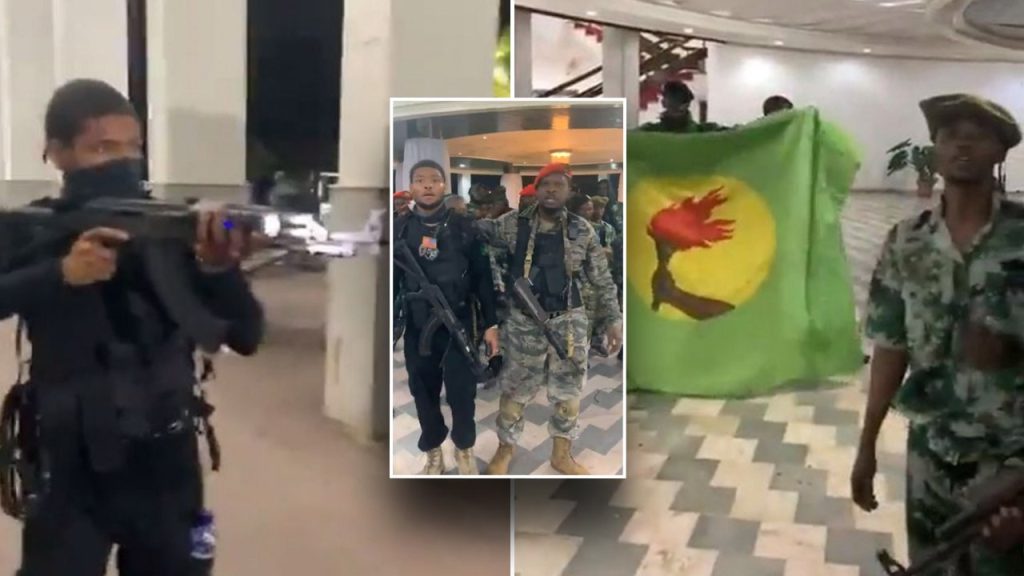A shocking criminal complaint was unsealed in Utah, detailing serious charges against four U.S. citizens accused of planning a coup d’état in the Democratic Republic of the Congo (DRC). The individuals, identified as Marcel Malanga, Tyler Thompson, Benjamin Zalman-Polun, and Joseph Peter Moesser, are facing multiple serious allegations including conspiracy to provide support for a military uprising, use of weapons of mass destruction, and plans to kill or kidnap foreign officials. These charges stem from a botched coup attempt that resulted in casualties, drawing attention to the complex political and security issues in the DRC.
| Article Subheadings |
|---|
| 1) Overview of the Coup Attempt and its Origins |
| 2) The Allegations Against the Individuals Involved |
| 3) Contextualizing the DRC’s Political Climate |
| 4) Legal Implications and Potential Sentences |
| 5) Future Legal Proceedings and Investigations |
Overview of the Coup Attempt and its Origins
The attempted coup in the Democratic Republic of the Congo has drawn international attention, particularly surrounding its orchestrators. On a significant date in late May, four American citizens conspired to overthrow the DRC government, striking fear into the hearts of not only the country’s leaders but also the wider international community. This conspiracy aimed to assassinate key figures including President Félix Tshisekedi and Deputy Prime Minister Vital Kamerhe, reflecting a deep-rooted dissatisfaction with the current political climate. Reports suggest the aim was to establish a new regime, dubbed “New Zaire,” with Christian Malanga—who reportedly died in the course of these events—set to lead.
The Allegations Against the Individuals Involved
The U.S. Department of Justice has charged the four accused with multiple serious offenses. These include conspiracy to provide material support to a foreign entity intending to engage in armed uprisings, as well as intentions to use weapons of mass destruction—a charge that denotes a serious escalation in criminal behavior. According to reports, Marcel Malanga claimed the role of Chief of Staff of the Zaire army, while Benjamin Zalman-Polun served as the chief of staff to the slain Christian Malanga. Tyler Thompson and Joseph Peter Moesser rounded out the group, with Thompson identified as a soldier and drone operator, and Moesser as the group’s explosives supplier. The group allegedly plotted multiple attacks aimed directly at government buildings and residences, marking this operation as a highly organized attempt at insurrection.
Contextualizing the DRC’s Political Climate
The DRC has been rife with political instability and conflict, factors which have led to a fractious atmosphere of resistance against the government. Under President Tshisekedi, the nation has faced daunting challenges, ranging from corruption to armed conflicts, prompting certain factions to seek drastic changes through violent means. The societal landscape is complicated by various rebel groups operating within the country, making any coup attempts perilously risky. Domestic and international observers are left questioning whether the DRC can maintain stability amidst such violent efforts to alter its leadership.
Legal Implications and Potential Sentences
The implications of such charges are severe and far-reaching. If convicted, each individual could face significant prison time—potentially up to life sentences, particularly for charges associated with weapons of mass destruction and conspiracy to murder, which carry stiff penalties under both U.S. and international law. Furthermore, each conspirator may face additional charges for carrying firearms across national borders to engage in felony acts, which amplifies the seriousness of their allegations. The decision by the DRC government to commute the accused’s death sentences to life imprisonment also highlights the international legal ramifications surrounding the case.
Future Legal Proceedings and Investigations
Legal proceedings surrounding this case are expected to unfold in stages, and the defendants are likely to appear in court in Brooklyn, New York, followed by subsequent hearings in Salt Lake City, Utah. The investigations into their conspiracy, led by the FBI along with international partners, reflect a collaborative effort to understand and potentially dismantle organized attempts at violence abroad. The complexities of international law and extradition will play critical roles in determining how justice is administered in this unprecedented case involving U.S. citizens engaged in foreign insurrection activities.
| No. | Key Points |
|---|---|
| 1 | Four U.S. citizens are charged with conspiring to carry out a coup in the DRC. |
| 2 | The alleged coup involved plans to assassinate key officials, with various forms of military support to be provided. |
| 3 | The political environment in the DRC has prompted internal dissent, creating a breeding ground for such extremist actions. |
| 4 | Legal consequences for the accused could result in prison sentences ranging from several years to life imprisonment. |
| 5 | International collaboration is crucial to address cases of U.S. citizens engaging in foreign violence. |
Summary
The attempted coup in the DRC, involving four American citizens, serves as a stark reminder of the complexities surrounding global political stability and the lengths to which individuals might go in pursuit of power. With serious charges laid out by the U.S. government and potential life sentences looming, this case highlights critical legal and moral questions regarding actions taken by citizens abroad. As legal proceedings advance, the international community will be observing closely, mindful of the implications for both domestic and foreign policy in dealing with violent uprisings.
Frequently Asked Questions
Question: What were the accusations against the four U.S. citizens?
They were accused of conspiracy to provide material support for a coup attempt in the DRC, which included plans to kill government officials and use weapons of mass destruction.
Question: What could the potential sentences be for those charged?
If convicted, the individuals could face significant prison sentences, including life imprisonment, particularly for charges associated with weapons of mass destruction and conspiracy to commit murder.
Question: Why was the DRC president’s decision to commute their sentences significant?
The commutation of their death sentences to life imprisonment reflects the complexities of international law and the need for diplomatic considerations in dealing with U.S. citizens involved in foreign insurrection.


